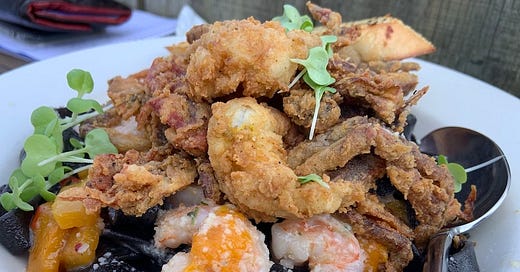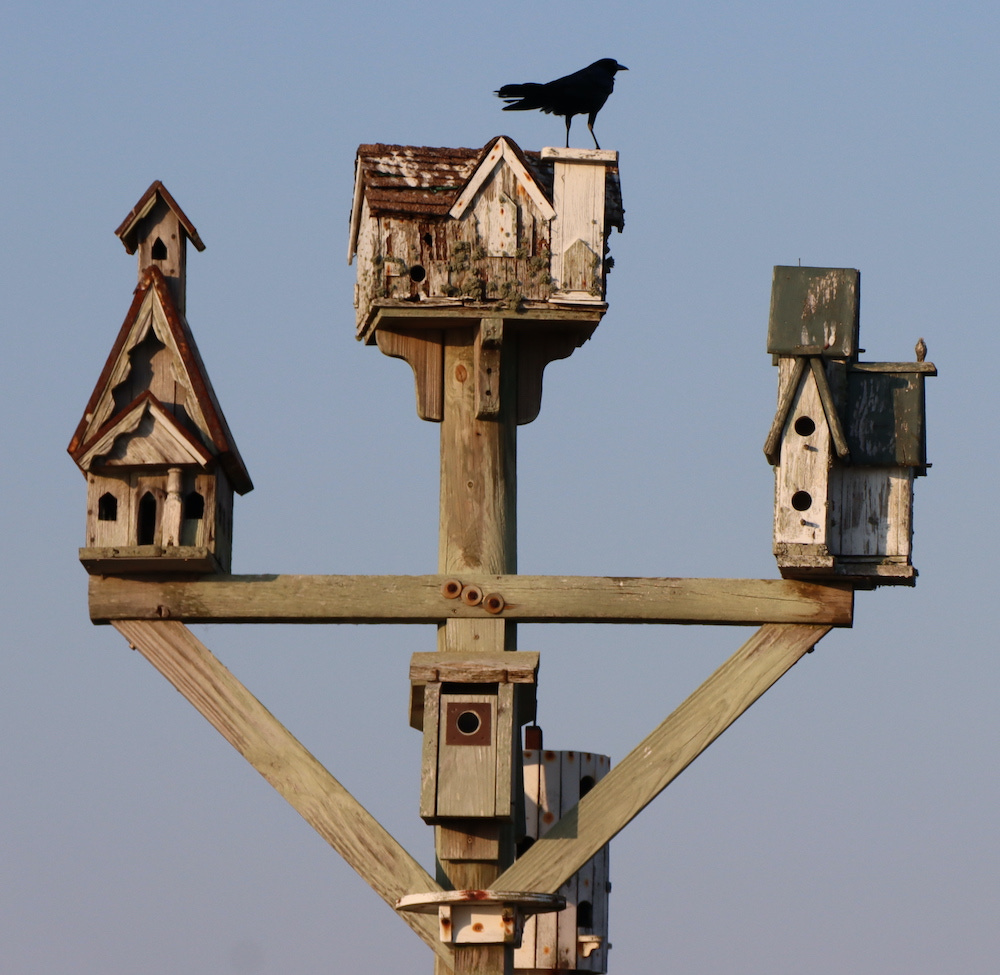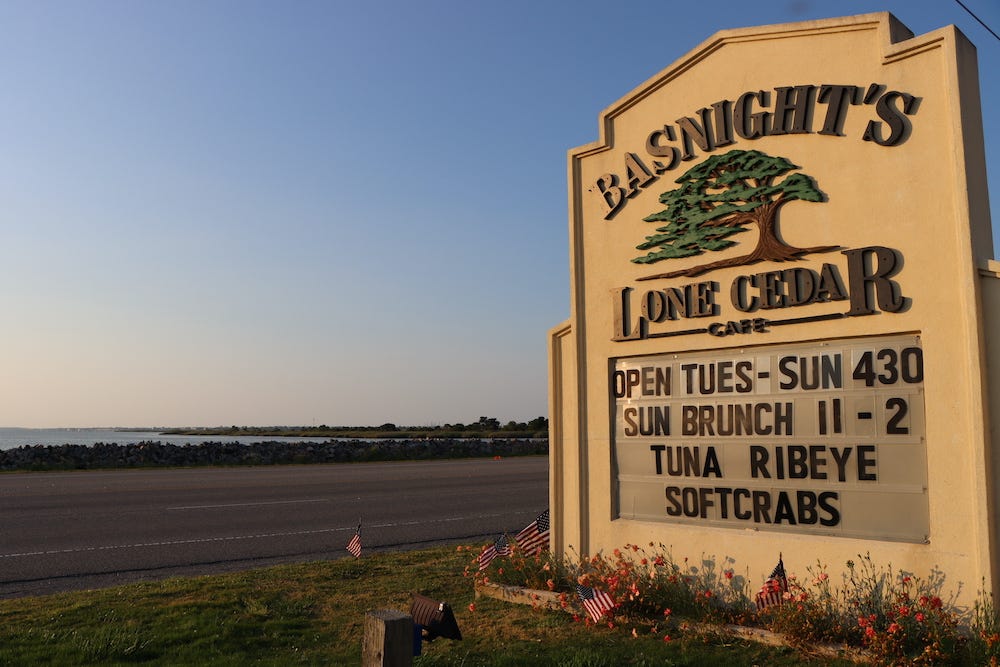It was Memorial Day weekend, and Donna Campbell and I had come to the coast to see the opening night of the 84th season of “The Lost Colony.” The refreshed script featured, for the first time, a Native American woman who narrates the mysterious story of the first English settlement on North Carolina’s Outer Banks. Centering the play first on the Indigenous people of the region seemed right.
Now, it was Saturday evening, and with pandemic restrictions loosened, beach goers were surging like the tide. We went out early for a seafood supper, hoping to beat the crowds.
I knew my entrée the minute I opened the menu: “Soft Shell Pasta—Sauteed Shrimp, Cherry Tomatoes and Roasted Peppers in a Lemon White Wine Sauce over Squid Ink Tagliatelle Pasta topped with Fried Soft Shells.”
We might have been on the coast of Italy, but for the local soft shell crabs, available annually in a very short window. The Lone Cedar Cafe’s menu explained that the crab had been caught by Vicki Basnight, daughter of the longest-serving legislative leader in North Carolina’s history, the late Marc Basnight of Manteo, who passed away just months ago, in late December 2020.
Earlier that afternoon we had come upon his grave in the center of town. The marker aptly featured a clam shell carved in stone above the family name. Marc was a seafood connoisseur, and the smaller marker on the ground with his given name was naturally decorated with seashells from the beach. A full bird feeder had been set out to the side, and hungry songbirds were coming and going in the afternoon heat.
As in so many things environmental, state Senator Marc Basnight was ahead of his time. He launched the Clean Water Management Trust Fund in 1996, the same year his family opened The Lone Cedar Café on the causeway between Roanoke Island and Nag’s Head on the North Carolina coast. When arsonists burned the restaurant to the ground in 2007, Basnight rebuilt using sustainable materials and green building techniques. The family also began naming all of its local suppliers of fish and fresh produce on the menu to celebrate the hardworking producers in the region.
Today, around the base of the enormous restaurant building that seats 366 guests, a matrix of extensive raised beds are growing homegrown herbs, flowers, lettuces, and other vegetables. Vickie’s house-made pepper jelly accompanied two appetizers on the menu that night—the bacon-wrapped Atlantic Ocean scallops and the “soft crab bites.” David Shields’s cobia was being pan seared in the kitchen and plated with house grown snow peas, turnips, radishes, carrots, broccoli and red peppers. Fresh grilled tuna caught by Carter Mann came with jalapeno-glazed sweet potatoes and succotash. Farmer Lewis Nixon had delivered all the vegetables for the sides of the day, the menu explained
This practice and pride in naming purveyors was not so common when Basnight began, and to add to the environmental messaging baked into every dish, the family put up towering timbers that rise from the shallows of the azure Roanoke Sound to house nesting birds. A pair of ospreys, a species believed to mate for life, was busy securing their own dinner that evening. Regular customers know the pair as Lucy and Ricky. While we watched, Ricky periodically took flight in search of fish and seaweed as Lucy sat on her eggs in the enormous woven nest of sticks set at eye level with the outdoor tables on the deck. Meanwhile, our bottle of Elk Cove Rosé, one among 2,000 bottles in the Lone Cedar wine cellar, arrived. Our server, a recent immigrant from Eastern Europe, uncorked an intensely pink liquid that would eventually be mimicked by the evening sky.
As if on cue, 25 Canada geese, including a dozen fuzzy goslings, paddled in a parade alongside the osprey towers and headed toward the distant marsh, while a raven landed and posed atop an artistic arrangement of fanciful bird houses posted on another platform. As more and more human diners arrived, they watched in delight. They drew out their cellphones and made their way to the edge of the deck to capture a shot of the ospreys and the long view of Oregon Inlet to the south.
We shared a cup of the Wanchese chowder--a simple, clear broth, that featured local clams, bacon, potatoes, and the righteous tang of the ocean. The clams were perfectly cooked, not at all chewy. (Wanchese, today a fishing village at one end of Roanoke Island, was named for a Native American who journeyed back to London with the first explorers and then decided to end his relationship with the English. He disappeared upon his return to this continent.)
When the main dish arrived, we recalled the last time we’d been served pitch black pasta—in a dreamy alfresco restaurant on the Mediterranean in Cinque Terra with our feet literally in the sand. This dish was no less glorious both in flavor and presentation.
Our server later told us that Marc’s daughters, Vicki and Caroline, were “expediting” in the kitchen and coming out once in a while to greet guests. After Covid, re-hiring staff had been a challenge, she said, but the menu was not compromised. It was full of the tastes of North Carolina’s finest gifts, prepared with a deep appreciation of the fragility of our coastlines and their bounty.
Marc Basnight retired in 2011 after thirteen terms in the legislature and nine as president pro tempore of the senate. According to his obituary, Basnight worked with five different house speakers and three governors in his era. He was not only a man who knew good food and relished the very edge of North Carolina where he came from, but he supported the arts statewide. He had performed as a child in the legendary Paul Green drama, “The Lost Colony.” It was a family ritual to take part in the summer play. Basnight never forgot the thrill of the stage and knew the show’s value to the local community. Years later, he helped citizen historian Dorothy Spruill Redford find the funds needed to present an accurate history of the enslaved African American families (including Redford’s own) at Somerset Place, an antebellum plantation restored in nearby Tyrrell County. Basnight appreciated the complexity and conflict in the collective stories of his constituents. He worked across party lines at every turn to achieve his aims. He made a difference by being different.
Author’s note: Food Pilgrim Georgann Eubanks’s book The Month of Their Ripening: North Carolina Heritage Foods Through the Year, is coming out in paperback from UNC Press on August 1. You can preorder with a discount. See this link.











Beautifully written. And it was a good thing I had already eaten dinner because I salivated through the entire piece! I want to go to Basnight's! Thanks for another Food Pilgrim post that marries excellent writing and wonderful food tales.
I want to be on your train!
Beautiful post!